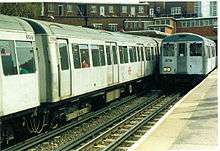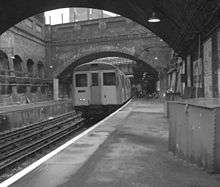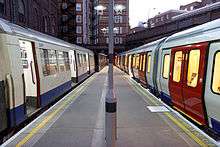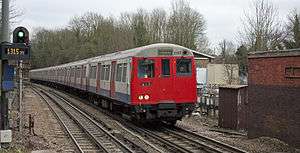London Underground A60 and A62 Stock
| A60 and A62 Stock | |
|---|---|
|
Amersham-bound A Stock Metropolitan line train approaching Chorleywood station, Hertfordshire. | |
|
The refurbished interior of an A60 Stock train in 2010 | |
| In service | 12 June 1961–26 September 2012 (51 years, 106 days) |
| Manufacturer | Cravens[1] |
| Built at | Sheffield, England[1] |
| Replaced |
T Stock F Stock P Stock 1938 Stock Steam-hauled trains used on Amersham branch |
| Constructed | 1960–1962 |
| Entered service | 1961–1963 |
| Refurbishment |
Adtranz (at Derby)[1] 1994–1998 |
| Scrapped | 1987/1994/2011–2012 |
| Number built | 58 trains |
| Number in service | 2 trains + 2 cars (depot only) |
| Number preserved | 1 car |
| Number scrapped | 55 trains + 5 cars |
| Formation | DM-T-T-DM (per unit) |
| Fleet numbers |
DM: 5000-5233 T: 6000-6233 |
| Capacity |
DM: 54 seats + 4 tip-up seats T: 58 seats |
| Operator(s) | London Underground |
| Depot(s) | Neasden Depot |
| Line(s) served |
Metropolitan line (1961–2012) East London line (1977–1985/1987–2007) |
| Specifications | |
| Car body construction | Aluminium |
| Train length | 212 ft (64.62 m) (4 cars) |
| Car length | 636.5 in (16,167 mm) |
| Width | 116 in (2,946 mm) |
| Height | 145 in (3,683 mm) |
| Entry | Level |
| Doors |
DM: two double and one single T: three double |
| Wheel diameter | 3 ft (914 mm) |
| Maximum speed | 70 mph (110 km/h) |
| Weight |
DM: 32.1 t (31.6 long tons; 35.4 short tons) T: 21.8 t (21.5 long tons; 24.0 short tons) |
| Traction system | Resistance control by pneumatic driven camshaft (Associated Electrical Industries)[1] |
| Traction motors | G.E.C. (Witton) type LT114 motor (300Vdc series wound) [1] |
| Transmission | 17:74 ratio |
| Auxiliaries | Motor-Alternator-Rectifier MG3005 (Associated Electrical Industries)[1] |
| Electric system(s) | 630 V DC fourth rail |
| Current collection method | Contact shoe |
| UIC classification | Bo′Bo′+2′2′+2′2′+Bo′Bo′ |
| Track gauge |
1,435 mm (4 ft 8 1⁄2 in) standard gauge |
The London Underground A60 and A62 Stock[2] operated on the Metropolitan line from 12 June 1961[3][4][5] to 26 September 2012, and on the East London Line from 1977 until 22 December 2007 (except in 1986, when one-man operation conversion of the fleet took place).
The stock was built in two batches (A60 and A62) by Cravens of Sheffield in the early 1960s, and replaced all other trains on the line.
At the time of its withdrawal in September 2012, the stock was the oldest on the Underground, and on any subway system in Europe. It was the only stock to have luggage racks, umbrella hooks and separate motoring and braking controls, and the last to have no automated announcements.
Development and introduction
The design was formulated by W S Graff-Baker of the London Passenger Transport Board, as part of the electrification of the Metropolitan line from Rickmansworth to Amersham and Chesham under the 1935–1940 New Works Programme,[6] and owes much to the smaller 1938 Stock. The project was delayed by World War II and lack of funds during the austerity period after the war. In 1946 two experimental trailers similar in exterior appearance to the production trains were built using underframes from T Stock, but they were scrapped when the trials concluded.[7] Graff-Baker died in 1952, before the trains were finally built.
When electrification commenced in 1959, London Transport placed an order for 31 A60 Stock trains to replace both T Stock on services to Watford and Rickmansworth, and locomotive-hauled services to destinations north of Rickmansworth. The first units, 5004 and 5008, entered service to Watford in June 1961.[3][4][5] The Amersham/Chesham services began later that year. London Transport later ordered 27 A62 Stock trains; these were introduced between 1961 and 1963 to replace F and P Stocks on the Uxbridge service. By December 1963 the roll-out was complete.[7]
The trains were designated as A Stock to mark the electrification of the Metropolitan line to Amersham. Four-car units were used on the East London line (then a branch of the Metropolitan line) from June 1977 to April 1985, May 1987 to 24 March 1995 and 25 March 1998 to 27 December 2007, when the line closed to become part of the London Overground network.[7]
Design

The stock was a compromise between the needs of longer-distance “outer suburban” passengers on the outer reaches of the line and short-distance “urban” passengers over the heavily used Circle and Hammersmith & City lines. For this reason the trailer cars have three sets of doors per car.
A distinctive feature was the use of transverse seating only, uncommon on the Underground. This is because it was designed for journeys which might last over an hour. Most of the seating was of the high-capacity transverse 3 + 2 arrangement.[8] Four tip-up seats were provided at the rear of the driving motor.[9] Despite each 8-car train seating 448 passengers,[10] the stock provided fewer seats than the locomotive-hauled and T stock trains that they replaced, but more seats than the S Stock which started to replace them on 31 July 2010. The stock had luggage racks and umbrella hooks, the only Underground stock to have these features, despite their presence on most contemporary National Rail trains.
A60 and A62 stocks were nearly identical in appearance. The most significant differences were the border around the destination window on A62 motor cars and the make of compressor under the trailer cars: A60 stock used the Westinghouse DHC 5A, A62 cars the Reavell TBC 38Z.[11]
At 116 in (2,900 mm) they were the Underground's widest trains.[12] The stock was refurbished between 1993 and 1998 by Adtranz (now Bombardier) in Derby. Car end windows were installed, the seating was reupholstered, and the livery was updated.[10] At the time of refurbishment the Metropolitan line had a low priority for receiving new trains.[13]
Operation

Each unit consisted of four cars: two powered driving motors at each end and two non-powered trailers in between. Each unit was further divided into two semi-permanently-coupled sets, a driving motor and trailer. Although the intention was to operate four-car trains in the off-peak, this practice was short-lived except for the Chalfont & Latimer–Chesham shuttle, which was always operated by a single four-car unit. For its main services the stock operated in a two-unit formation of eight cars between Aldgate and Amersham, Chesham (peak hours only), Uxbridge and Watford.
When built it had a top speed of 70 mph (110 km/h) (world's fastest fourth-rail train), but from the late 1990s/early 2000s it was restricted to 50 mph (80 km/h) to improve reliability.
Other areas of operation
In addition to the Metropolitan line, A Stock was permitted to traverse the following sections, subject to the following restrictions:[14]
| Section | Passengers permitted | Coupled units permitted | Notes |
|---|---|---|---|
| Acton Town to Northfields and Northfields Depot | Yes | No | Westbound local line only No access to Siding 7 at Northfields Depot |
| Aldgate to Mansion House | No | Yes | |
| Baker Street to Edgware Road | Yes | Yes | No access to side platforms at Edgware Road |
| Edgware Road to Hammersmith | No | No | Specific authorization is required to run on this section |
| Edgware Road to High Street Kensington | No | No | |
| Embankment to High Street Kensington and Rayners Lane (via Acton Town), including the Cromwell Curve | No | Yes | No access to the Acton Town, Barons Court, and South Harrow sidings 15 miles per hour (24 km/h) speed limit at three bridges between Acton Town and South Harrow. |
| Embankment to Mansion House | No | No | |
| Jubilee Line tracks between Finchley Road and Stanmore | Yes | Yes | No access to the Wembley Park and West Hampstead sidings Usage permitted only when ATO is not in use |
Roster
Cars had a four-digit number. The first digit identified the type of car (driver or trailer), the last three digits the set (000 to 231).
| Sub-type | Driving Motors (DM) | Trailers (T) |
|---|---|---|
| A60 | 5000 to 5123 | 6000 to 6123 |
| A62 | 5124 to 5231 | 6124 to 6231 |
| Citation: Hardy 2002, p. 36 | ||
In further detail:
| Renumbered - unit exists, number withdrawn (x23x ) | |
| (original unit) Scrapped before 2010 | |
| Withdrawn | |
| Scrapped after the introduction of S Stock | |
| Rail Adhesion Train (not in service) |
^ operational DM
† Renumbered
+ Replaced/formed with a renumbered car
| A60 | ||||||||||||||||||||||||||||
|---|---|---|---|---|---|---|---|---|---|---|---|---|---|---|---|---|---|---|---|---|---|---|---|---|---|---|---|---|
| A DM | T | D DM | A DM | T | D DM | A DM | T | D DM | A DM | T | D DM | A DM | T | D DM | A DM | T | D DM | |||||||||||
| ^5000 | 6000 | 6001 | 5001 | ^5022 | 6022 | 6023 | 5023 | ^5044 | 6044 | 6045 | 5045 | ^5066 | 6066 | 6067 | 5067^ | ^5088 | 6088 | 6089 | 5089^ | ^5110 | 6110 | 6111 | 5111^ | |||||
| ^5002 | 6002 | 6003 | 5003 | ^5024 | 6024 | 6025 | 5025 | ^5046 | 6046 | 6047 | 5047 | ^5068 | 6068 | 6069 | 5069 | ^5090 | 6090 | 6091 | 5091 | 5112 | 6112 | 6113 | 5113^ | |||||
| ^5004 | 6004 | 6005 | 5005[2] | ^5026 | 6026 | 6027 | 5027 | ^5048 | 6048 | 6049 | 5049 | ^5070 | 6070 | 6071 | 5071 | ^5092 | 6092 | 6093 | 5093^ | ^5114 | 6114 | 6115 | 5115^ | |||||
| ^5006 | 6006 | 6007 | 5007[2] | ^5028†[c] | 6028†[c] | 6029 | 5029 | ^5050 | 6050 | 6051 | 5051 | ^5072 | 6072 | 6073 | 5073 | ^5094 | 6094 | 6095 | 5095^ | ^5116+[d] | 6116 | 6117†+[e] | 5117^†+[e] | |||||
| 5008†+[a] | 6008†[a] | 6009†[b] | 5009†[b] | ^5030 | 6030 | 6031 | 5031 | ^5052 | 6052 | 6053 | 5053 | ^5074 | 6074 | 6075 | 5075 | ^5096 | 6096 | 6097 | 5097^ | ^5118 | 6118 | 6119 | 5119^ | |||||
| ^5010 | 6010 | 6011 | 5011 | ^5032 | 6032 | 6033 | 5033 | ^5054 | 6054 | 6055 | 5055 | ^5076 | 6076 | 6077 | 5077 | ^5098 | 6098 | 6099 | 5099^ | ^5120 | 6120 | 6121 | 5121^+[g] | |||||
| ^5012 | 6012 | 6013 | 5013 | 5034†+[a] | 6034 | 6035 | 5035 | ^5056 | 6056 | 6057 | 5057^ | ^5078 | 6078 | 6079 | 5079 | ^5100 | 6100 | 6101 | 5101^ | ^5122 | 6122 | 6123 | 5123^ | |||||
| ^5014 | 6014 | 6015 | 5015 | 5036†[d] | 6036[s] | 6037†[e] | 5037†[e] | ^5058 | 6058 | 6059 | 5059^ | ^5080 | 6080 | 6081 | 5081 | ^5102 | 6102 | 6103 | 5103^ | ^5232+[c] | 6232+[c] | 6233+[e] | 5233^+[e] | |||||
| ^5016 | 6016 | 6017 | 5017 | ^5038 | 6038 | 6039 | 5039 | ^5060 | 6060 | 6061 | 5061^ | ^5082 | 6082 | 6083 | 5083 | ^5104 | 6104 | 6105 | 5105^ | ^5234+[a] | 6234+[a] | 6235+[b] | 5235^+[b] | |||||
| ^5018 | 6018 | 6019 | 5019 | ^5040 | 6040 | 6041 | 5041 | 5062 | 6062 | 6063 | 5063^ | ^5084 | 6084 | 6085 | 5085 | ^5106 | 6106 | 6107 | 5107^ | |||||||||
| ^5020 | 6020 | 6021 | 5021 | ^5042 | 6042 | 6043 | 5043 | ^5064 | 6064 | 6065 | 5065^ | ^5086 | 6086 | 6087 | 5087 | ^5108 | 6108 | 6109 | 5109^ | |||||||||
| A62 | ||||||||||||||||||||||||||||
| A DM | T | D DM | A DM | T | D DM | A DM | T | D DM | A DM | T | D DM | A DM | T | D DM | A DM | T | D DM | |||||||||||
| ^5124 | 6124 | 6125 | 5125 | ^5142 | 6142 | 6143 | 5143[2] | 5160 | 6160 | 6161 | 5161^ | 5178 | 6178 | 6179 | 5179^[2] | 5196 | 6196 | 6197 | 5197^[1] | 5214 | 6214 | 6215 | 5215^ | |||||
| ^5126 | 6126 | 6127 | 5127 | 5144 | 6144 | 6145 | 5145^ | 5162 | 6162 | 6163 | 5163^ | 5180 | 6180 | 6181 | 5181^ | 5198 | 6198 | 6199 | 5199^ | 5216 | 6216 | 6217 | 5217^ | |||||
| ^5128 | 6128 | 6129 | 5129 | 5146 | 6146 | 6147 | 5147^ | 5164 | 6164 | 6165 | 5165^ | 5182 | 6182 | 6183 | 5183^ | 5200 | 6200 | 6201 | 5201^ | 5218+[f] | 6218 | 6219 | 5219^ | |||||
| ^5130 | 6130 | 6131 | 5131 | 5148 | 6148 | 6149 | 5149^ | 5166 | 6166 | 6167 | 5167^ | 5184 | 6184 | 6185 | 5185^ | 5202 | 6202 | 6203 | 5203^ | 5220 | 6220 | 6221 | 5221^ | |||||
| ^5132 | 6132[s] | 6133 | 5133 | 5150 | 6150 | 6151 | 5151^ | 5168 | 6168 | 6169 | 5169^ | 5186 | 6186 | 6187 | 5187^ | 5204 | 6204 | 6205 | 5205^ | 5222 | 6222 | 6223 | 5223^ | |||||
| ^5134 | 6134 | 6135 | 5135 | 5152 | 6152 | 6153 | 5153^ | 5170 | 6170 | 6171 | 5171 | 5188 | 6188 | 6189 | 5189^ | 5206 | 6206 | 6207 | 5207^ | 5224 | 6224 | 6225 | 5225^ | |||||
| ^5136 | 6136 | 6137 | 5137 | 5154 | 6154 | 6155 | 5155^ | 5172 | 6172 | 6173 | 5173^[1] | 5190 | 6190 | 6191 | 5191^ | 5208†[f] | 6208 | 6209 | 5209†[g] | 5226 | 6226 | 6227 | 5227^ | |||||
| ^5138 | 6138 | 6139 | 5139 | 5156 | 6156 | 6157 | 5157^ | 5174 | 6174 | 6175 | 5175^ | 5192 | 6192 | 6193 | 5193^ | 5210 | 6210 | 6211 | 5211^ | 5228 | 6228 | 6229 | 5229^ | |||||
| 5140 | 6140 | 6141 | 5141^ | 5158 | 6158 | 6159 | 5159^ | 5176 | 6176 | 6177 | 5177^ | 5194 | 6194 | 6195 | 5195^ | 5212 | 6212 | 6213 | 5213^ | 5230 | 6230 | 6231 | 5231^ | |||||
Renumberings:[15]
a. 5034 and 5008 swapped numbers in July 1985; new 5008 and 6008 became set 234 on September 1994, 5034 preserved at the London Transport Museum, Acton.
b. set 9 renumbered 235 in September 1994.
c. set 28 renumbered 232 in June 1985.
d. 5036 renumbered 5116 in April 1993 (original 5116 scrapped in 1987 - collision at Kilburn, December 1984)
e. set 117 renumbered 233 in August 1985; set 37 renumbered 117 in April 1993.
f. 5208 renumbered 5218 in August 1992 (original 5218 scrapped in 1994 - experimental suspension)
g. 5209 renumbered 5121 in March 1993 (original 5121 scrapped in 1994 - collision at Neasden depot, October 1986)
Converted works vehicles:
s. Sandite dispenser car.
Withdrawals:
1. Underground News. London Underground Railway Society (588): 737. December 2010. Missing or empty |title= (help);
2. Underground News. London Underground Railway Society (591). March 2011. Missing or empty |title= (help);
Withdrawal

A60 Stock reached 50 years of service on 12 June 2011.[16] The age of the stock made spare parts harder to obtain and vehicles had to be cannibalised to keep the rest of the stock in operation.
S8 Stock replaced the stock, with the first unit introduced on 31 July 2010.[17] This is similar to the S7 Stock for the District, Circle and Hammersmith & City lines; the main differences are the layout and number of seats and the provision of two sand hoppers for each rail due to the different conditions at the country end of the line.[18] The withdrawal of A Stock commenced on 9 October 2010.
In February 2012 the London Transport Museum began offering luggage racks from withdrawn A Stock for sale.[19]

The last train ran in passenger service on 26 September 2012, formed of 5034 + 5062.[20] The same train was used on 29 September 2012 for the final ticket-only railtour, organised by the London Transport Museum. It ran from Moorgate along the entire Metropolitan line, including Watford, Amersham, Aldgate, Uxbridge, Chesham and the Watford North curve. The tour ended at Wembley Park: on the final stretch from Finchley Road, the train was unofficially recorded at 74 mph. One of the driving motor cars, 5034, was part of the first (as 5008) and also the last A Stock train, giving it a life of over 51 years. It was sent to Northwood sidings on 8 October 2012 and loaded onto lorries for disposal. The historical age and significance of No.5034 saw it taken to the Acton Museum Depot for preservation but vehicle 5062 was scrapped.
The stock outlasted many former British Rail EMUs: the Scottish Class 303 managed 43 years, the Class 309 Clacton Express units 38 years and British Rail Class 312 only 28 years. The former Southern Region 4CIG and 4CEP managed 46 and 49 years respectively. The stock was one of Britain's longest-serving types of train, although falling short of the service length of the ex-1938 Stock still in use on the Isle of Wight around 77 years after construction, or the 81 years of Glasgow Subway rolling stock between 1896 and 1977. A Stock may be outlasted by the InterCity 125 HSTs and the Bakerloo Line 1972 tube stock.[21]
Citations
- 1 2 3 4 5 6 "Rolling Stock Data Sheet, London Underground (First Edition)" (PDF). WhatDoTheyKnow. Retrieved 17 April 2016.
- ↑ Rolling Stock Information Sheets (PDF), Transport for London, March 2007, pp. 16–17, retrieved 23 September 2010
- 1 2 Hardy, Brian (1988). London Underground Rolling Stock (11th ed.). Capital Transport. p. 35. ISBN 0904711943.
- 1 2 Hardy, Brian (2002). London Underground Rolling Stock (15th ed.). p. 36. ISBN 1854142631.
The first train of A60 stock entered passenger service on 12 June 1961 (units 5004 and 5008).
- 1 2 Metropolitan Line No 2 Section Working Timetable No 189 12.6.61 (Working Timetable), London Underground, 1961
- ↑ Glancey, Jonathan (2007-10-22). "Classics of everyday design No 33". London: The Guardian. Retrieved 2010-05-11.
- 1 2 3 Hardy 2002, p. 36
- ↑ "A60/62 stock". SQUAREWHEELS.org.uk. Retrieved 20 December 2010.
- ↑ Hardy 2002, p. 37
- 1 2 "'A' Stock". Transport for London. Retrieved 20 December 2010.
- ↑ Mugridge, Peter (8 August 2012). "Tube's A-listers bow out". Rail. Bauer Media (702): 54–59. ISSN 0953-4563.
- ↑ "London Underground Rolling Stock Dimensions". London Underground. Retrieved 2008-04-03.
- ↑ Bayman, Bob (2008), London Underground: Official Handbook (6th ed.), Capital Transport, p. 33, ISBN 978-1-85414-317-4
- ↑ "Clive's UndergrounD Line Guides". Clive's UndergrounD Line Guides. Retrieved 28 July 2010.
- ↑ Hardy 2002, p. 98
- ↑ "Marking 50 Years of A Stock | District Dave's London Underground Site". Districtdavesforum.co.uk. Retrieved 27 June 2013.
- ↑ Underground News. London Underground Railway Society (585): 516–517. September 2010. ISSN 0306-8617. Missing or empty
|title=(help) - ↑ Underground News. London Underground Railway Society (584): 440A–444A. August 2010. ISSN 0306-8617. Missing or empty
|title=(help) - ↑ "Metropolitan Line luggage racks". Retrieved 2 March 2012.
- ↑ "A Stock last day on the Metropolitan Line". Railways Today. 26 September 2012. Retrieved 2 November 2012.
- ↑ "Saying goodbye to oldest tube train". London Tonight - ITV London. 26 September 2012. Retrieved 28 September 2012.(subscription required)
Further reading
- Hardy, Brian (2002), London Underground Rolling Stock (15th ed.), Capital Transport, ISBN 1-85414-263-1
- Mugridge, Peter (8 August 2012), "Tube's A-listers bow out", RAIL, Bauer Media Group (702): 54–59, ISSN 0953-4563
- Underground News, London Underground Railway Society, ISSN 0306-8617 Missing or empty
|title=(help)
External links
| Wikimedia Commons has media related to London Underground A60 and A62 stock. |
- A60/62 stock (SquareWheels)

_-_geograph.org.uk_-_1506771.jpg)